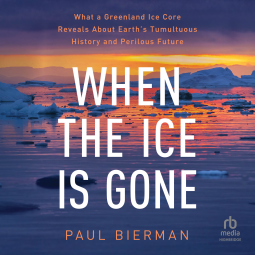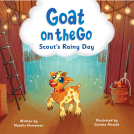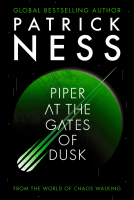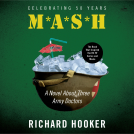
When the Ice is Gone
What a Greenland Ice Core Reveals About Earth's Tumultuous History and Perilous Future
by Paul Bierman
Narrated by David Marantz
This title was previously available on NetGalley and is now archived.
Send NetGalley books directly to your Kindle or Kindle app
1
To read on a Kindle or Kindle app, please add kindle@netgalley.com as an approved email address to receive files in your Amazon account. Click here for step-by-step instructions.
2
Also find your Kindle email address within your Amazon account, and enter it here.
Pub Date Aug 20 2024 | Archive Date Sep 03 2024
HighBridge Audio | Highbridge Audio
Talking about this book? Use #WhentheIceisGone #NetGalley. More hashtag tips!
Description
In When the Ice Is Gone, Bierman traces the story of this extraordinary finding, revealing how it radically changes our understanding of the Earth and its climate. A longtime researcher in Greenland, he begins with a brief history of the island, both human and geological. For the origins of ice coring, Bierman brings us to Camp Century, a US military base built inside Greenland's ice sheet, where engineers first drilled through mile-thick ice and into the frozen soil beneath. Decades later, a few feet of that long-frozen earth would reveal its secrets—ancient warmth and melted ice.
Changes in Greenland reverberate around the world, with ice melting high in the arctic affecting people everywhere. Bierman explores how losing Greenland's ice will catalyze devastating events if we don't change course and address climate change now.
Advance Praise
"A remarkable scientific detective story, told with panache―and carrying a very real and dangerous sting. Read it, and then do something about it." ―Bill McKibben, author of The End of Nature
"We are Scrooge and Bierman is Marley’s ghost with a fascinating tale, all too true, of a great ice sheet that holds our future." ―James E. Hansen, director of Columbia University's Program on Climate Science, Awareness and Solutions
Available Editions
| EDITION | Other Format, Unabridged |
| ISBN | 9781696616942 |
| PRICE | $19.99 (USD) |
| DURATION | 9 Hours, 5 Minutes |
Links
Average rating from 14 members
Readers who liked this book also liked:
Natalie Horseman
Children's Fiction, Outdoors & Nature, Parenting, Families, Relationships
Kristin Haynes
Children's Fiction, Parenting, Families, Relationships
Silvia Moreno-Garcia
Historical Fiction, Literary Fiction, Sci Fi & Fantasy
JUNO
Arts & Photography, Comics, Graphic Novels, Manga, Travel



















